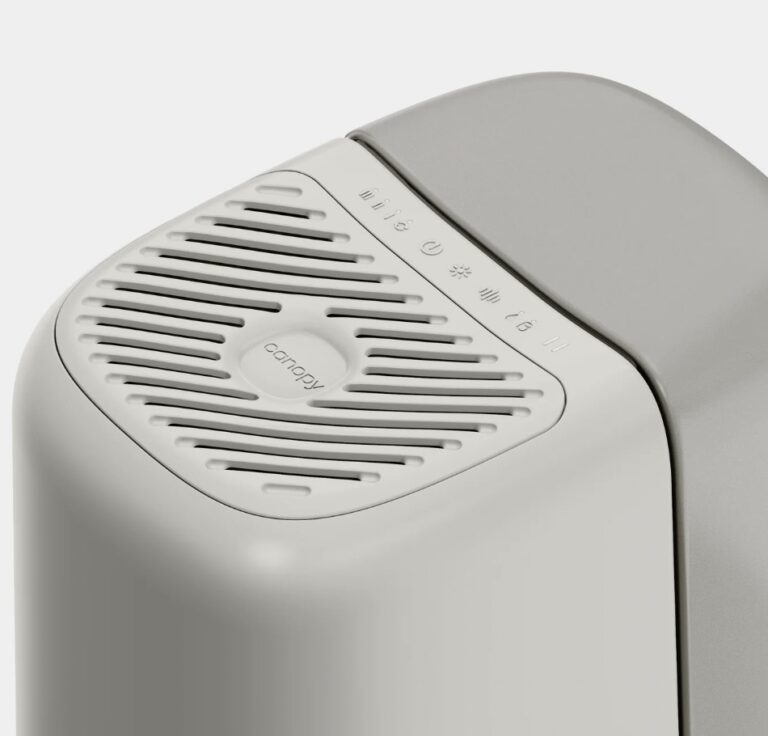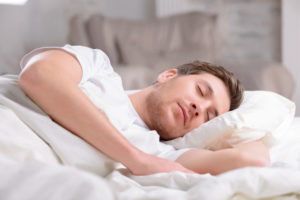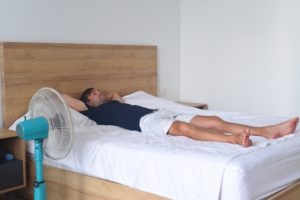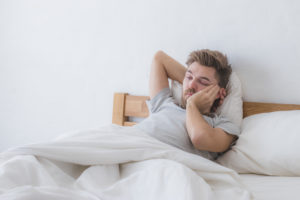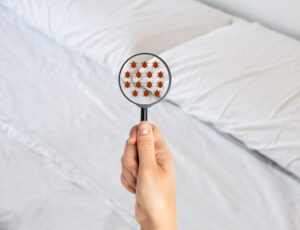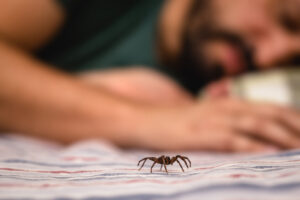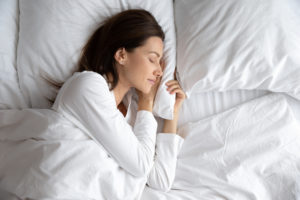When you buy through our links, we may earn a commission. Products or services may be offered by an affiliated entity. Learn more.
How to Sleep With a Cough or a Cold
- If your cold or cough gets worse at night, it can be beneficial to use cough medicine or a humidifier and elevate your head and neck.
- You may experience a cough that gets worse at night due to postnasal drip, which often accompanies a cold.
- Getting plenty of sleep can help you recover from a cold and decrease your risk of getting sick.
Each year, up to 30 million doctor’s visits occur to address coughing. Many people also likely experience coughing without seeking treatment, as it is a symptom of the common cold, flu, and several other common respiratory viruses.. When you have a cough, you might notice it interfering with your sleep. Thankfully, there are actions you can take to help yourself obtain the sleep you need to feel better.
Looking to improve your sleep? Try upgrading your mattress.
Consume Honey
Before reaching for cold medication, experts recommend parents give children over 12 months of age honey as a safer treatment for upper respiratory infections like the cold. For non-infant children, consuming honey before bedtime has been shown to reduce how often and how severely a child coughs at night. Children and parents alike may enjoy improved sleep when a sick child takes honey before sleeping.
Researchers focus their honey studies on children in particular because over-the-counter cough medicines pose more risks to children than they do to adults, so finding an alternative treatment is more important for this age group. However, adults can also try honey to treat a cough. Honey is known to have multiple protective effects, including being potentially antiviral, antifungal, and antibacterial
Try Cough Medicine
As part of the body’s immune response, coughing serves a purpose. Some medical experts caution that overusing medication that suppresses coughing could impact how long a person takes to recover from their illness. If you find that cough medicine helps you sleep, then it may be worthwhile to use it in moderation, keeping in mind the potential side effects. For a dry cough, a lozenge before sleep may be sufficient to calm the cough reflex so you can fall asleep.
Research studies demonstrate mixed results when it comes to the effectiveness of cough medicines. Many studies have found that cough medicines do not provide any more of a benefit than a placebo does, and many cough medicines are associated with unpleasant side effects.
Try a Nasal Decongestant
Nasal decongestants contain substances that target the blood vessels in order to open up the nasal passages and decrease postnasal drip, which indirectly helps reduce coughing at night. Most nasal decongestants are available over-the-counter in the form of tablets, drops, or nasal sprays.
Like cough medicine research, studies on using nasal decongestants to treat the common cold have produced mixed results. Although they may work for some people, they can also bring side effects such as high blood pressure, headaches, nausea, dizziness, and insomnia. They should not be used for longer than five days, and they should only be used by children under the advice of a physician.
Drink a Warm Liquid
Hot tea and chicken soup are popular home remedies often said to relieve cold symptoms, though the effect of hot liquids on a cold has not been widely studied. One study from the 1970s found that ingesting hot liquids, such as hot water or chicken soup, reduced nasal congestion.
A more recent study found that a hot drink did not have any objective effect on the ability to breathe easily through the nose, but it did lead to people reporting that they could breathe more easily. Additionally, people who drank the hot drink reported that they felt less chilly and tired, and their throats were not as sore. In conclusion, having a warm cup of tea or bowl of soup when you are feeling under the weather is worth a try.
Elevate Your Head and Neck
Coughs related to postnasal drip can become a greater problem once a person lies down, due to gravity. If your cough seems to worsen once you lie flat, try propping up your head and neck. Use a wedge pillow or multiple bed pillows to make yourself comfortable while lying in a position that keeps your head elevated above the rest of your body. While this may help adults, it is not a recommended therapy for young children.
Use a Humidifier
Some studies have found that higher humidity levels are more favorable for clearing the nasal passages, though other studies have found a lack of evidence on whether using a humidifier affects nasal symptoms.
If your bedroom is excessively dry, you may want to consider investing in a humidifier to keep humidity levels between the recommended 30% to 50%. Keeping humidity levels above 40% also may make the influenza virus less infectious, which may help protect others in your household. That said, a house that is too humid can also aggravate airway symptoms for some people, so it is best to stay within the recommended limits. It is important to clean a humidifier regularly and only use distilled water.
Why Do I Cough More at Night When I’m Sick?
People may experience coughing at night — called a nocturnal cough — for multiple reasons. Our bodies naturally cough to protect us by removing mucus and foreign objects from the windpipe, voice box, and lungs. Generally, coughing serves the same function whether it happens at night or during the daytime.
When you are sick, your cough might worsen at night due to postnasal drip. Postnasal drip refers to secretions that run down the back of the throat instead of coming out of the nose. This symptom often accompanies a cold, as well as the flu, allergies, and sinus infections. Lying on your back can worsen postnasal drip, which may be why you notice worse coughing at night.
How Does a Cold Affect Your Sleep?
Over 40% of people report that sleeping more than normal helps as they deal with a cold, yet it is natural to have trouble sleeping when you have a cold. In a survey conducted across several countries, 46% of people reported that having a cold or the flu disrupts their ability to receive good sleep. Additionally, 94% reported that when sick with a cold or flu, symptoms wake them up at night.
Although a cough is the symptom that is most likely to wake you up at night when you have a cold, other cold symptoms such as aches and pains, a sore throat, runny nose, and the need to sneeze might also disturb your sleep. People experiencing a fever may have fever dreams. These unusual, negative dreamscould also make sleeping more difficult while you are sick.
Can You Sleep Off a Cold?
Medical professionals have not yet found a cure to the common cold, but they recommend obtaining plenty of rest as you recover. Sleep and the immune system are closely linked, so receiving adequate sleep generally promotes healing. Research suggests sleep improves immunity because of its effects on hormones in the body and the inflammation response.
People who are sleep deprived in the week before being exposed to the cold virus are more likely to develop symptoms than people who receive adequate sleep. Studies suggest that those who sleep less than five hours per night are more than twice as likely to become symptomatic than those who sleep more than seven hours per night. Those who sleep less than seven hours per night are almost three times more likely to develop a cold than those who sleep at least eight hours.
When to Talk to Your Doctor
The common cold and its associated symptoms, such as a cough, typically last for about seven to 10 days. If your cough or cold symptoms persist beyond this timeframe or feel particularly severe, make an appointment with your doctor. Although many people recover from a cold easily, those with a compromised immune system or certain illnesses are at risk of the cold developing into a more serious infection, such as pneumonia or bronchitis.
Medical Disclaimer: The content on this page should not be taken as medical advice or used as a recommendation for any specific treatment or medication. Always consult your doctor before taking a new medication or changing your current treatment.

Still have questions? Ask our community!
Join our Sleep Care Community — a trusted hub of sleep health professionals, product specialists, and people just like you. Whether you need expert sleep advice for your insomnia or you’re searching for the perfect mattress, we’ve got you covered. Get personalized guidance from the experts who know sleep best.
References
11 Sources
-
Cohen, H. A., Rozen, J., Kristal, H., Laks, Y., Berkovitch, M., Uziel, Y., Kozer, E., Pomeranz, A., & Efrat, H. (2012). Effect of honey on nocturnal cough and sleep quality: A double-blind, randomized, placebo-controlled study. Pediatrics, 130(3), 465–471.
https://pubmed.ncbi.nlm.nih.gov/22869830/ -
Ahmed, S., Sulaiman, S. A., Baig, A. A., Ibrahim, M., Liaqat, S., Fatima, S., Jabeen, S., Shamim, N., & Othman, N. H. (2018). Honey as a potential natural antioxidant medicine: An insight into its molecular mechanisms of action. Oxidative Medicine and Cellular Longevity, 2018, 8367846.
https://pubmed.ncbi.nlm.nih.gov/29492183/ -
Deckx, L., De Sutter, A. I., Guo, L., Mir, N. A., & van Driel, M. L. (2016). Nasal decongestants in monotherapy for the common cold. The Cochrane Database of Systematic Reviews, 10(10), CD009612.
https://pubmed.ncbi.nlm.nih.gov/27748955/ -
Sanu, A., & Eccles, R. (2008). The effects of a hot drink on nasal airflow and symptoms of common cold and flu. Rhinology, 46(4), 271–275.
https://pubmed.ncbi.nlm.nih.gov/19145994/ -
Pieterse, A., & Hanekom, S. D. (2018). Criteria for enhancing mucus transport: A systematic scoping review. Multidisciplinary Respiratory Medicine, 13, 22.
https://pubmed.ncbi.nlm.nih.gov/29988934/ -
Environmental Protection Agency. (2001, July 13). Mold coure chapter 2: why and where mold grows.
https://www.epa.gov/mold/mold-course-chapter-2 -
Noti, J. D., Blachere, F. M., McMillen, C. M., Lindsley, W. G., Kashon, M. L., Slaughter, D. R., & Beezhold, D. H. (2013). High humidity leads to loss of infectious influenza virus from simulated coughs. PloS One, 8(2), e57485., Retrieved August 11, 2021, from
https://pubmed.ncbi.nlm.nih.gov/23460865/ -
Khosravi, M., Collins, P. B., Lin, R. L., Hayes, D., Jr, Smith, J. A., & Lee, L. Y. (2014). Breathing hot humid air induces airway irritation and cough in patients with allergic rhinitis. Respiratory Physiology & Neurobiology, 198, 13–19.
https://pubmed.ncbi.nlm.nih.gov/24709444/ -
Schredl, M., & Erlacher, D. (2020). Fever dreams: An online study. Frontiers in Psychology, 11, 53.
https://pubmed.ncbi.nlm.nih.gov/32047464/ -
Besedovsky, L., Lange, T., & Haack, M. (2019). The Sleep-Immune Crosstalk in Health and Disease. Physiological reviews, 99(3), 1325–1380.
https://pubmed.ncbi.nlm.nih.gov/30920354/ -
Cohen, S., Doyle, W. J., Alper, C. M., Janicki-Deverts, D., & Turner, R. B. (2009). Sleep habits and susceptibility to the common cold. Archives of Internal Medicine, 169(1), 62–67.
https://pubmed.ncbi.nlm.nih.gov/19139325/



